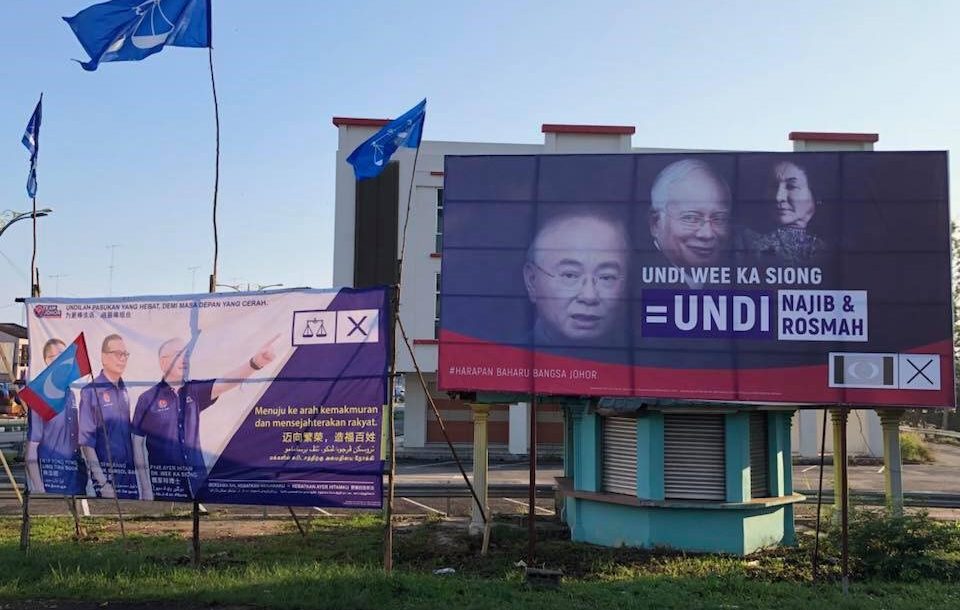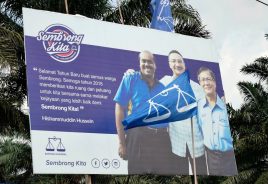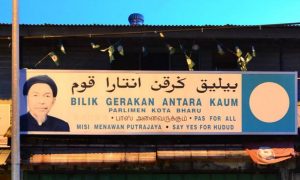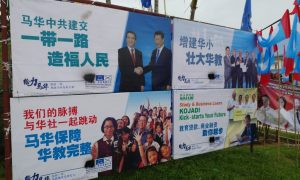Malaysia’s 14th general election (GE14) is a do or die battle for Chinese-based political parties in the UMNO-led Barisan Nasional. To woo back the Chinese support, they have been conveniently relying on the charm of China. But one man’s meat is another man’s poison: this may not be a wise move given inequality is on the rise in the Chinese community, and it could also backfire in the Malay community as they have been traditionally sceptical towards the communist country.
This election has always been a tough one, for the Malaysian Chinese Association (MCA) and other BN Chinese parties. The ground in the Chinese community has not changed significantly compared to five years ago, when the “Chinese Tsunami” hit and the BN Chinese parties were almost drowned, only being kept on life support by UMNO after the election. It was estimated that almost 80-90% of the Chinese supported opposition parties in that election. The Chinese-dominated Democratic Action Party (DAP) was the biggest winner.
DAP is hoping in this election that it can wipe out MCA, as well as Gerakan, another national Chinese-based BN party. If they succeed, this will help Pakatan Harapan, the opposition coalition, to reach closer to Putrajaya, where the federal government sits. To do so, DAP has sent its rising stars to challenge MCA and Gerakan’s heavyweights in their constituencies, a strategy which has been dubbed by local vernacular papers as “king versus king”—while MCA, Gerakan and some Chinese guilds have slammed this as “Chinese kill[ing] Chinese”. There has been speculation that if MCA and Gerakan lose in this election, UMNO will woo DAP into government and the two parties will risk becoming obsolete.
While fighting for own survival, MCA is dragged down by its toxic brand. Chinese netizens have been calling the party mai hua, which means betraying the Chinese. Many have lamented the failure of MCA to stand up strongly against UMNO on various issues, such as the recent Robert Kuok fiasco, the Cina Babi (Chinese Pigs) name-calling and the private member’s bill from PAS president Hadi Awang. Some MCA candidates have even conspicuously excluded the party’s logo and name from their campaigning materials, instead identifying themselves as “team X” or “team Y”, which are usually named after a particularly popular candidate or state leader.
The Prime Minister, Najib Razak, whom the party relied to woo Chinese support in the last general election, isn’t helpful this time. In GE13, a vote for MCA was regarded as a vote for Najib and his 1Malaysia policies. This time around, MCA has been trying to avoid that association due to the 1MDB scandal. The party’s deputy president has condemned the opposition’s billboards, which claimed a vote for MCA is a vote for Najib and Rosmah (who is the prime minister’s wife and is accused of practising extravagant lifestyle), as politics of hatred, and the billboards (see photo below) were removed by the election commission.

Photo: Xiao Tao Ubah TV Facebook
With scant domestic wow factors to woo the Chinese, MCA is looking out of the country—and China is apparently the answer. Billboards have been set up showcasing MCA leaders shaking hand with Xi Jinping, China’s president, and Jack Ma, the founder of Alibaba. Some campaigning materials are even more blunt. A banner of one MCA candidate in the state of Perak reads: “voting BN equals supporting China”.
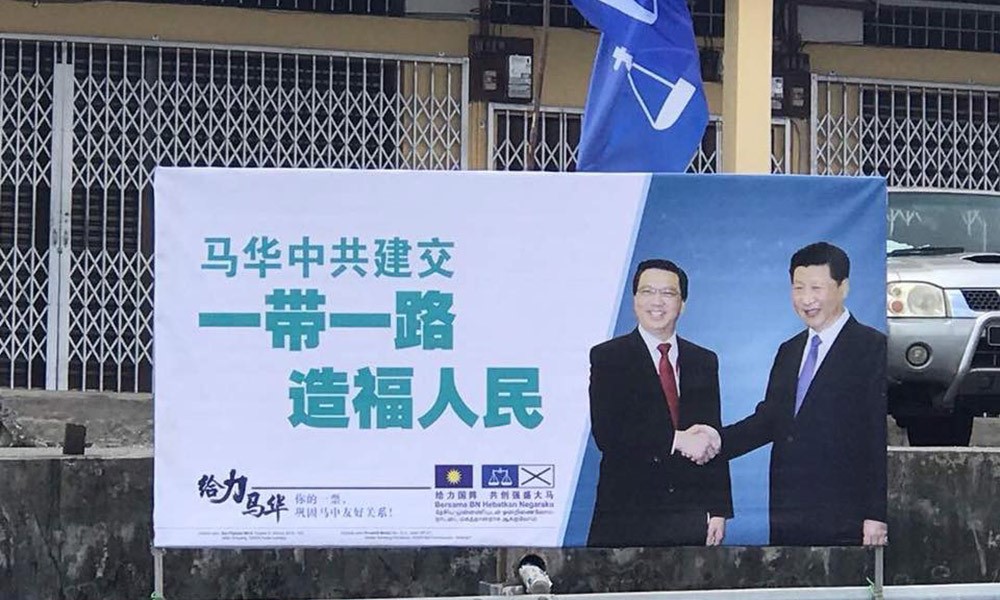
MCA president Liow Tiong Lai and Xi Jinping in Kuala Lumpur (Photo: Malaysiakini)
Such a strategy is perhaps not a surprise. Historically, the China card has proven helpful to BN in winning Chinese support due to its sentimental value in the ethnic community. A classic example is the 1974 general election, which was held three months after Malaysia’s establishing diplomatic ties with China. BN successfully regained ground from the humiliating setback in the previous general election of 1969.
There is, however, more of an economic reasoning to play the card now, given that China’s economic power is rising, and it has spillover effects for Malaysia. For example, durian planting in Malaysia is expanding rapidly due to the spike in demand from China. Many Malaysian Chinese tycoons also have significant businesses and investments in China.
The key message from MCA is that there will be trickle down effects from Malaysia’s trade and investment with China to the community, and if Pakatan Harapan wins, it will be disastrous to the close ties between the two countries. MCA and Gerakan particularly took aim at Pakatan Harapan chairman Mahathir Mohamed’s pledge to review controversial deals with China such as the 55 billion ringgit East Coast Rail Link (ECRL) project, accusing him of being anti-China.

A Chinese newspaper front page reads “political hype scares away China’s investment”.
But such a narrative loses touch with the complex political economy reality on the ground in the community.
Income inequality in the Chinese community is now the highest among Malaysia’s three main ethnic groups. Most Chinese are actually wage-earners, rather than businessmen, and they are also suffering from the rising cost of living and stalled wages. In some circumstances, the problem is made worse by China’s huge flows of money. For example, the massive housing development by China’s firms in the southern state of Johor, despite creating an oversupply, pushed up local housing prices to a high level. Many locals are also fuming with the ridiculously expensive price of durian, which is driven up by China’s demand.
There are also questions about whether the benefits from the mega projects really trickle down to the locals. China’s firms have been accused of bringing materials and workers directly from China into the country to deliver the projects. Even within the business community, those who benefited from mega deals with China are a very small exclusive group who have strong political connections. Small and medium-sized companies are usually left out. Many companies are also under pressure from stiff competition from China.
Notes from the campaign: Johor, Selangor, Perak
No Malaysian election campaign is complete without these highlights of food, flags and swag, as the GE14 season enters its final days.
More importantly, it is the governance of the deals with China, particularly the ECRL project, which have raised the most concerns. The project, which involves a soft loan from the Chinese government, is widely regarded as a bailout for Najib for the 1MDB scandal. Pakatan Rakyat argues it will undermine the country’s sovereignty. If the swing in Malay support towards Pakatan Harapan is strong enough, not only are MCA and Gerakan at risk of being wiped out, but UMNO will also suffer a huge loss, which will pave the way for the first ever federal transition in Malaysian history.
In a video which went viral on the social media, a MCA candidate was captured being told in Cantonese by a woman that “We will definitely support you… We will support BN to become the opposition”. This is definitely a result MCA does not want to see happen on 9 May.
 Facebook
Facebook  Twitter
Twitter  Soundcloud
Soundcloud  Youtube
Youtube  Rss
Rss 